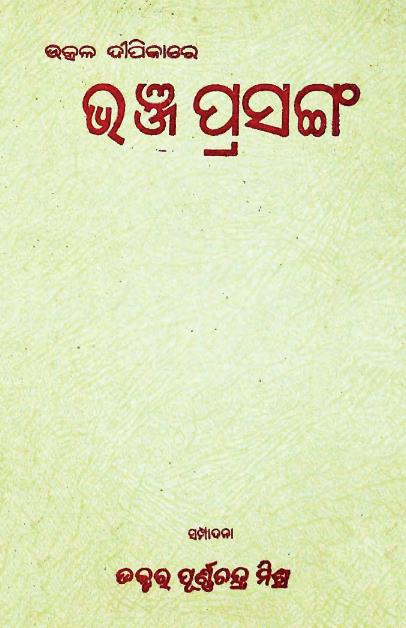The evolution of modern Odia literature is incomplete without acknowledging the contributions of eminent writers who have shaped its trajectory. Among them, the 20th-century writer and poet, Kumar Dhananjaya Bhanja, stands out as a luminary whose works enriched Odia literature. In his essay Utkal Dipikare Bhanja Prasanga, included in the anthology edited by Purna Chandra Misra in 1996, the exploration of Bhanja’s literary prowess offers a profound insight into the cultural and intellectual fabric of Odisha.
Utkal Dipika, a literary magazine launched in 1900, was pivotal in uplifting Odia literature during a period of cultural renaissance. It served as a platform for budding writers, poets, and thinkers to express their thoughts. Acclaimed for its innovative ideas and literary merit, Utkal Dipika also showcased Bhanja’s contributions prominently. Through this platform, Bhanja voiced his thoughts on a diverse range of themes, including social reform, nationalism, and the preservation of Odia culture. His essays and poetry reflected the emotional and intellectual struggles of the Odia people of his time, making him a significant figure in the magazine’s legacy.
Kumar Dhananjaya Bhanja’s literary style is marked by a harmonious blend of tradition and modernity. He seamlessly wove cultural narrative threads while embracing new forms of expression and thought. His poetry often draws from traditional Odia folklore, yet it encompasses modern themes that resonate with broader human experiences. This duality enriched his work, enabling him to connect with various demographics across social strata.
In the essay Utkal Dipikare Bhanja Prasanga, Purna Chandra Misra discusses how Bhanja’s literary endeavors served not only as artistic expressions but also as vehicles for social commentary. Bhanja’s writings often critiqued societal norms and offered insights into the pressing issues of his time, emphasizing the need for social justice and equality. Misra highlights specific works that reflect this ethos, urging readers to appreciate the layering of meanings within Bhanja’s verses.
Bhanja’s literary contributions extended beyond aesthetics; they played a crucial role in shaping the socio-political landscape of Odisha. His works ignited a sense of pride and identity among Odias, fostering a renaissance that sought to preserve and promote the Odia language and heritage. In an era when colonial rule threatened cultural identities, Bhanja’s writing acted as a clarion call for unity and self-awareness.
Misra’s exploration of Bhanja’s essays underlines the importance of literature as a form of resistance against oppression. The vibrant discussions within Utkal Dipika reflect a community’s determination to reclaim its narrative, influenced significantly by Bhanja’s pen.
In examining Utkal Dipikare Bhanja Prasanga, readers are invited to appreciate the richness of Bhanja’s literary contributions and their lasting impact on Odia literature. Purna Chandra Misra’s editorial efforts serve as a critical reminder that literature is not merely an artistic pursuit but a vital instrument for social change. Kumar Dhananjaya Bhanja remains a beacon in this regard, and his legacy continues to inspire current and future generations of writers and readers alike. The dialogue initiated by Bhanja resonates deeply within contemporary discussions surrounding culture, identity, and the socio-political landscape of Odisha, highlighting the timeless relevance of his work.
Books Info
| Books name | Utkal Dipikare Bhanja Prasanga/ଉତ୍କଳ ଦୀପିକାର ଭଞ୍ଜ ପ୍ରସଙ୍ଗ |
| Author | Purna Chandra Misra, Ed. |
| No Of pages | 101 |
| Publisher | Royal Book House |
| Publication | 1996 |
| Printed At | Radiant Process |
| Distributor | NA |

